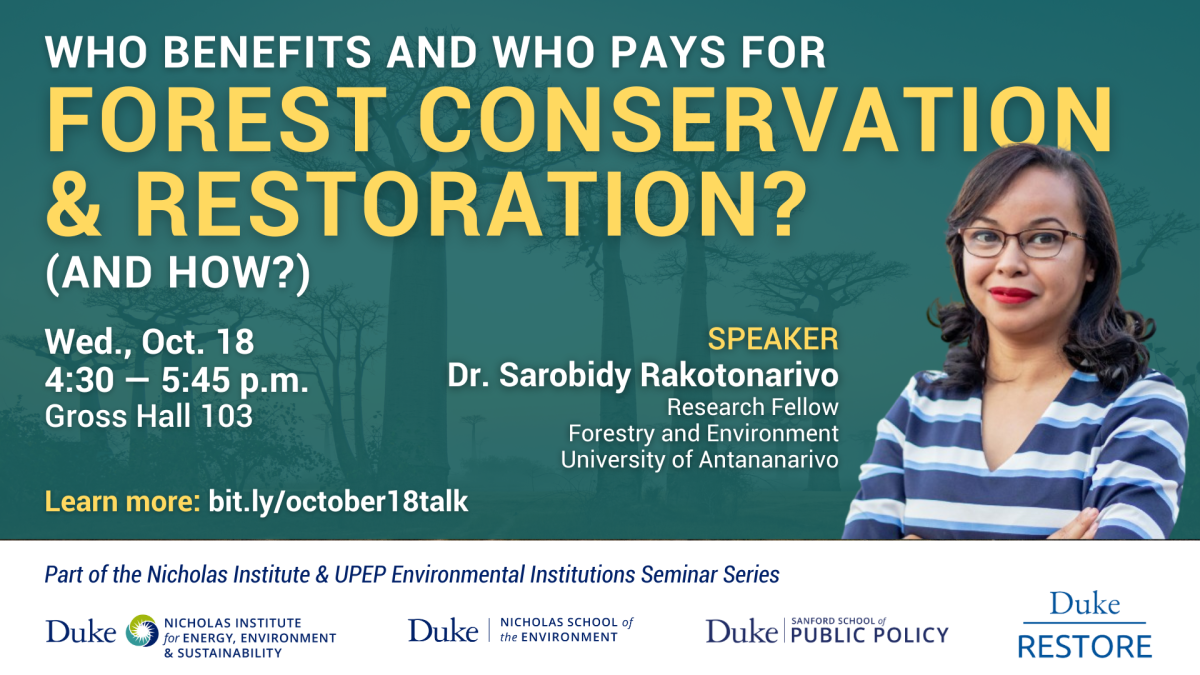About
Dr. Sarobidy Rakotonarivo, Research Fellow at the Department of Forestry and Environment at the University of Antananarivo, will speak at this session of the Environmental Institutions Seminar Series presented by the Nicholas Institute, the University Program in Environmental Policy, and Duke Restore. Students, faculty, and staff at Duke and other Triangle-area universities are invited to attend this in-person event (virtual viewing option also available).
While the importance of conserving ecosystems for sustainable development is widely recognized, it is increasingly evident that despite delivering global benefits, conservation often comes at local cost. Despite well-intentioned policies, some of the poorest people on the planet are still bearing the cost of forest conservation. Global restoration priority setting risks repeating mistakes of conservation by favoring high biodiversity and high poverty areas with low opportunity costs. Areas with the highest restoration potential also significantly overlap with areas of weak rule of law, and unrecognized and contested land tenure. There is a risk that this might lead to project failure, as well as significant welfare and human rights concerns. This is likely to be a bigger problem than currently recognized and without important efforts to resolve local tenure issues and meet social safeguards, forest conservation and restoration in developing countries might jeopardize, rather than contribute to, sustainable development goals.
There will be a reception in the Energy Hub of Gross Hall following the event.
SPEAKER
Dr. Rakotonarivo is a Research Fellow at the Department of Forestry and Environment at the University of Antananarivo in Madagascar. She earned a joint PhD in environmental and development economics from Bangor University, UK, and the University of Copenhagen, Denmark, in 2016. Her research interests include the social dimensions of nature-climate interventions in Africa, such as forest conservation, restoration, and climate-smart agriculture. She uses a mixed method approach, including field experiments and qualitative approaches to study the political and socioecological factors that increase their effectiveness. She is currently implementing a randomized controlled trial to study the impacts of knowledge and credit transfer on the adoption of climate-resilient agricultural techniques among members of village savings and loans associations in rural Madagascar. Her current research also examines the impact of COVID19 on food security and biodiversity, and the linkages between migration, climate change and socio-environmental changes in Madagascar. Since she returned to Madagascar in 2019, she has also engaged at the highest possible policy level to generate impact from her research to ensure nature-climate interventions are more effective and equitable.
This session of The Environmental Institutions Seminar Series is co-sponsored by Duke Restore. The Environmental Institutions Seminar Series is presented by the Nicholas Institute for Energy, Environment & Sustainability (NI) and the University Program in Environmental Policy (UPEP), a doctoral degree program jointly offered by the Nicholas School of the Environment and Sanford School of Public Policy at Duke University.

